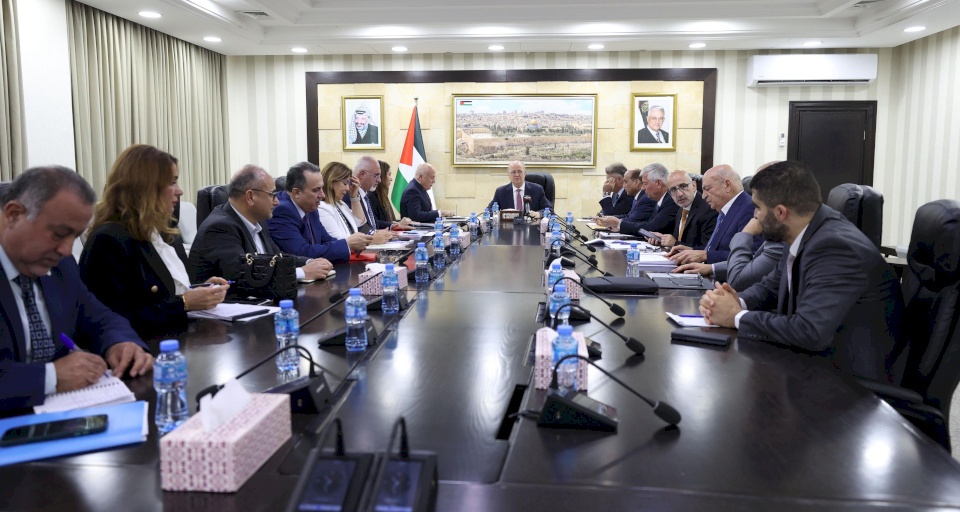
Mustafa Chairs an Urgent Meeting of the Permanent Economic Ministerial Committee
SadaNews - Today, Sunday, Prime Minister Dr. Muhammad Mustafa chaired an urgent meeting of the Permanent Economic Ministerial Committee in his office in Ramallah to follow up on the developments regarding the existing economic and financial challenges. The Prime Minister reviewed the most important challenges facing our economy and financial situation, summarizing them in seven main points as follows: 1. The economic contraction and decline in growth due to the war on Gaza and the Israeli measures in the West Bank over the past years. 2. The currency crisis resulting from Israel's refusal to accept billions of shekels accumulated in Palestinian banks, which has deep repercussions threatening the economic movement and the entire financial sector. 3. The continued withholding of more than 10 billion shekels in clearance funds, and a complete halt in transferring any amounts for the fourth consecutive month. 4. The prohibition of Palestinian workers from working inside the Green Line since the onset of the Gaza war, leading to unprecedented unemployment levels, with approximately 80% in the Gaza Strip and over 30% in the West Bank, posing a challenge to our national economy. 5. The ongoing tax and customs evasion due to our lack of control over the crossings and movement, depriving the government of collecting revenues estimated in the hundreds of millions of shekels. 6. The burden of public debt accumulated over the years, where the government is obligated to pay large sums to settle this debt, which exceeds the monthly local income. 7. The continuous dependence on Israel, particularly concerning goods and services such as electricity and petroleum, with Israel using this dependence as a weapon against us, as is happening today. In this regard, the Prime Minister stressed that the government, in cooperation with national institutions, has begun taking several steps to address the ongoing challenges, aiming to create lasting economic and financial change and stability. Among these steps are: 1. Launching the national development and improvement program, which includes 10 initiatives currently being implemented that will contribute to changing the structural framework of the economy and alleviating the financial crisis. 2. A financial reform program implemented by the Ministry of Finance, including measures to increase local income, halt financial leaks, improve public services, and promote digital transformation in conjunction with austerity measures and expenditure rationalization in cooperation with various competent authorities. 3. Working to increase international support, with significant developments in this direction compared to recent years, through the multi-track European support program, the support program provided by the World Bank as a grant to implement developmental projects and support the public budget, and a third program to secure emergency financial support developed in cooperation with the Arab brothers and international partners. This will be presented at the donors' conference to be held on the sidelines of the upcoming United Nations General Assembly meeting in the next few weeks, aiming to provide emergency financial support for six months to the budget, alongside securing international guarantees to support the government bond program to restructure public debt and its government, not increase it. 4. Concurrently with all this, efforts and work continue to recover our withheld funds and resolve the issue of accumulating shekels in cooperation with the Monetary Authority, by all possible means. 5. Cooperation with donors and international partners to assist our people in the Gaza Strip despite Israeli measures, and continuing efforts to prepare for a conference on the reconstruction of the sector. 6. Taking a series of measures to support national production and reduce dependence on Israel by working on a new investment law, forming a team to combat the flooding of the Palestinian market with foreign goods and protect national products, and mandating the purchase of national products in government tenders. 7. The issuance by the president of a series of necessary legislations to assist and improve the justice sector, including legislation and procedures to expedite litigation and digitize judicial procedures, as well as measures related to land settlement, and a set of laws related to digital economy, digital transformation, and competitiveness, with other laws underway to enhance the relationship between the public and private sectors. 8. Developing human resources to enhance productivity and the competitiveness of our national products regionally and globally by employing technology more extensively and launching vocational qualification programs. The Prime Minister concluded by noting that despite the significant challenges facing our national economy, especially under the comprehensive war waged by the occupation against our people and its measures to prevent stability and counter the political achievements we are making, we continue our efforts and steps to overcome this difficult phase, emphasizing the necessity of expanding the circle of collective action and national workshops with the participation of the private sector and civil society.

American Military Review in the Arabian Sea After Muscat Talks: "Peace Through Strength"

America Accuses China of Conducting Secret Nuclear Tests

Report: Wafiq Safa, Head of Hezbollah's Coordination and liaison Unit Resigns

Report: Iran Accelerates Missile Facility Repairs Compared to Nuclear

Ending of Iran-U.S. Negotiations in Muscat and Agreement to Resume... Iraqi: Good and Limi...

What Does the Participation of a U.S. Military Leader in Iran Negotiations Mean?

The Occupation Arrests a Female Journalist and a Male Journalist at a Military Checkpoint...

